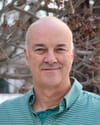In Segregated Roanoke, Black and White Churchgoers Gather To Study the Bible — and Find Ways To Improve the City
The bible study sessions, organizers say, are but a small step in overcoming generations of institutionalized segregation in Roanoke.
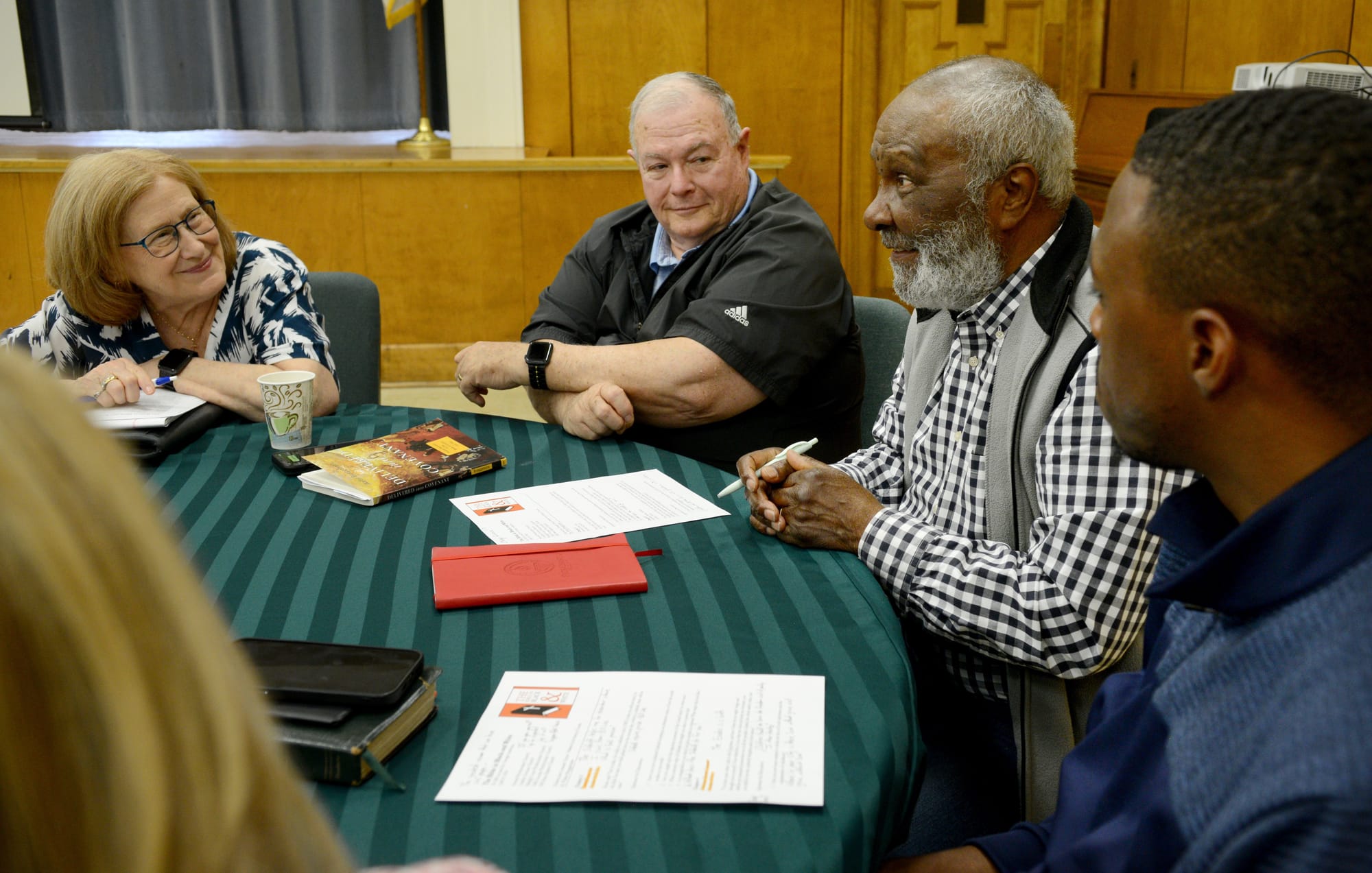
The Rev. Bill Lee believes it’s raining manna all over Roanoke.
Lee stood before a roomful of listeners and recounted the story from Exodus of the miracle food from heaven that sustained the Jewish people as they wandered in the wilderness after their escape from Egypt. He asked his audience, Black and white people, church-goers from congregations across the city, if they believed manna still covered the ground today.
“What sustains us?” he asked. “What is all the stuff that God has made available to us, the manna, that we are not picking up? God didn’t stop giving manna in 2024. It’s everywhere.”
Lee’s examples were not honey-flavored crackers from the Old Testament. Instead, he pointed to modern-day opportunities that seem like miracles to someone who grew up in a rural area in the 1950s and ’60s like he did, opportunities such as a community college system that’s available to anyone.
And online classes that allow a person to earn a degree while working a fulltime job. Even a greenway system of trails that deliver people into the peace of nature are a gift from God, he said.
“I call it manna,” he said before a slight pause.
The crowd sat mostly in rapt attention, except for the occasional “amen” or antiphonal “mm-hmmm.”
This was not your typical Sunday sermon, and not just because it was delivered on a Wednesday afternoon. The audience wasn’t a usual Roanoke congregation either. This gathering was meant to bring Christians from different churches, denominations, backgrounds and races together.
Every week in April, parishioners from five Roanoke churches — three historically Black congregations, Loudon Avenue Christian, Fifth Avenue Presbyterian and Hill Street Baptist, and two predominantly white churches, Second Presbyterian and Raleigh Court Presbyterian (which I occasionally attend) — are gathering to listen, talk, learn, drink coffee and fellowship with folks whom they perhaps otherwise would have never met.
The sessions are called “The Bible in Black and White” and are held at Second Presbyterian in Roanoke’s Old Southwest neighborhood. The meetings were initiated by two ministers: Lee, a Black retired pastor who spent 39 years in the pulpit at Loudon Avenue before retiring in 2016, and Second Presbyterian’s George Anderson, a white preacher who has been in Roanoke since 1998.
About 80 people attended each of the first two sessions on April 3 and 10 inside a fellowship hall at Second Presbyterian. The meetings are open to the public, regardless of where or whether attendees go to church.
“We do this because it’s important for people from different churches to develop friendships and communities across racial lines and really get to know each other,” Anderson said. “We think we can address problems and make progress in the community in an organic, effective way.”
Those problems include poverty, homelessness, crime, lack of work and educational opportunities and other inequities that sometimes cut across racial and generational lines.
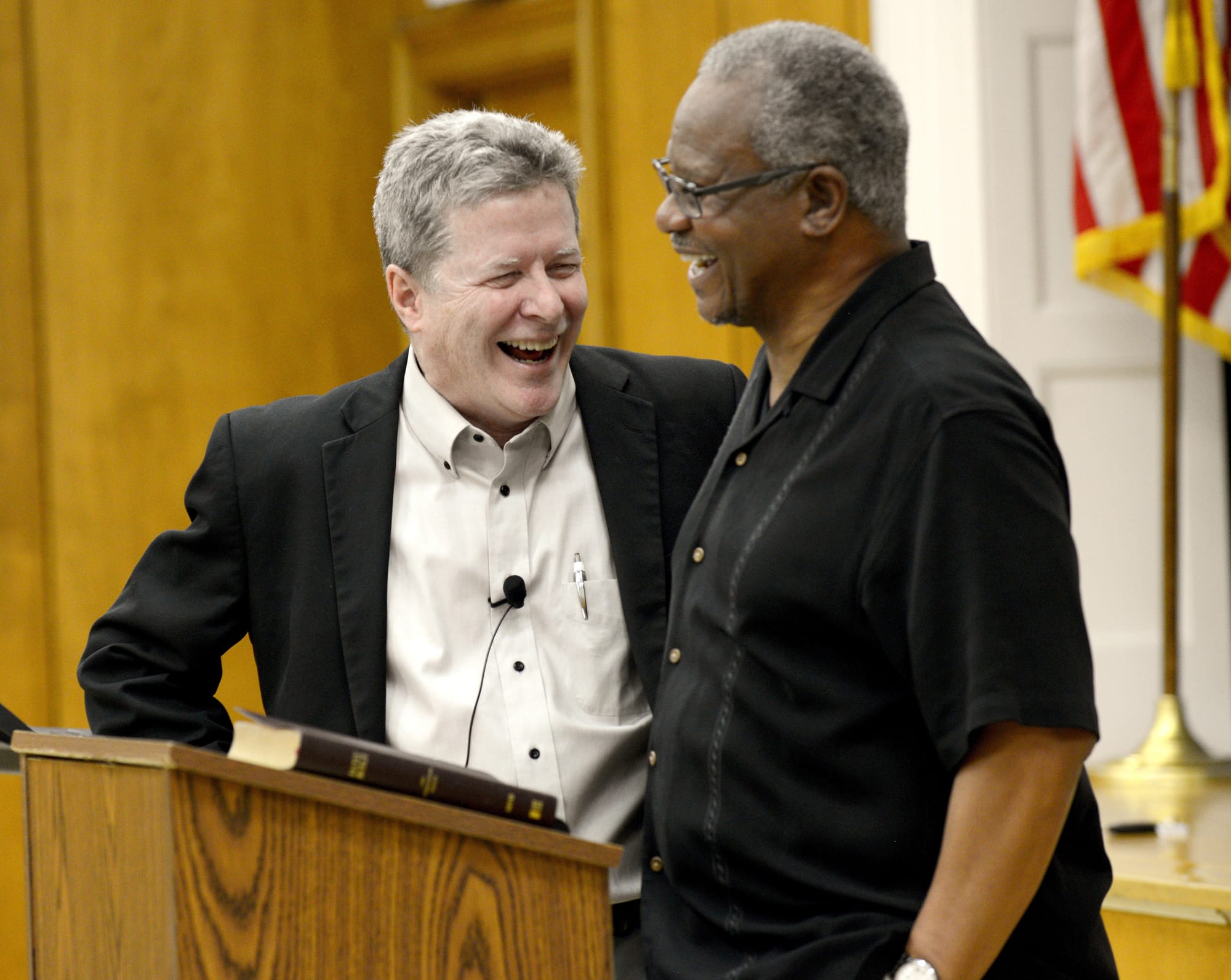
Roanoke is frequently ranked among Virginia’s most segregated municipalities. The city has long been home to the highest concentration of African-American residents in Southwest Virginia, a region that contains several counties where Black residents make up less than 1 percent of the population. A 2012 report by the Weldon Cooper Center for Public Service at the University of Virginia found that Roanoke was among the top five most-segregated localities in the state.
The city was segregated practically from its beginnings in 1882, with Black residents settling in neighborhoods north of the railroad tracks. In the early 20th century, Roanoke was one of many Virginia municipalities that barred minorities, which included Blacks and foreign-born residents, from owning homes in certain neighborhoods. In fact, many housing developments in Southwest Roanoke, which included the neighborhood where Raleigh Court Presbyterian Church is located, restricted “any Negro or Syrian” from buying a house there. Many of these restrictions were still in place as late as the 1950s. (Syrian was the name given to Roanoke’s growing and thriving Lebanese population in the early 1900s.)
Then, starting in the 1950s, city leaders enacted “slum clearance” plans with federal money to eradicate hundreds of homes, churches, schools and businesses in Black neighborhoods. That period of “urban renewal” is still a source of neighborhood and family trauma for people whose lives were uprooted.
The bible study sessions, organizers say, are but a small step in overcoming generations of institutionalized segregation in Roanoke.
The meetings evolved from earlier meetings between Lee and Anderson that started in the wake of one of the worst racial crises in recent years: the death of George Floyd, a Black man killed by a white policeman in Minneapolis in 2020 in an act that was caught on video by a bystander. A wave of protests swept the country after Floyd’s killing, including a large demonstration in Roanoke on May 30, 2020, that rolled across downtown near the Roanoke Police Department.
Anderson reached out to his friend Lee beseeching advice and wisdom for addressing the tragedy and the racial reckoning that unfolded. As people hunkered down in their homes and refrained from in-person gatherings during the early Covid lockdowns, the two ministers held a Facebook Live question-and-answer event “that went mini-viral,” Anderson said.
Buoyed by the response to the Q-and-A, the two men sought to continue the public conversation.
“Let’s sustain this as more than a one-time thing,” Lee said.
Smaller groups gathered the next couple of years before Lee and Anderson invited more churches into the meetings.
The format for the bible studies and conversations is mostly informal. The group is studying passages within Exodus, which includes some required weekly reading of the book, “Delivered Into the Covenant: Pivotal Moments in the Book of Exodus” by Old Testament scholar Walter Bruggeman. The ministers kick off the sessions with about 10 to 15 minutes of remarks, then people cover a range of topics while seated at tables inside the hall.
Anywhere from three to eight people usually sit at the tables, men and women, Black and white, many of them in their 60s or older. The discussions don’t always stick to the discussion questions, which seems to be fine with everybody.
On April 3, after Lee gave his brief sermon about modern manna available for the taking, some people talked about how difficult it can be to see all the good around in a modern world. Some of the conversations turned to worries about how technology dominates daily lives.
“I worry about young people,” a woman said.
“Not just the young people,” another woman replied.
At a separate table, a group of women used the question prompt of finding God’s glory in “wilderness places” as a jumping-off spot for talking about finding spiritual nourishment in unlikely locations.
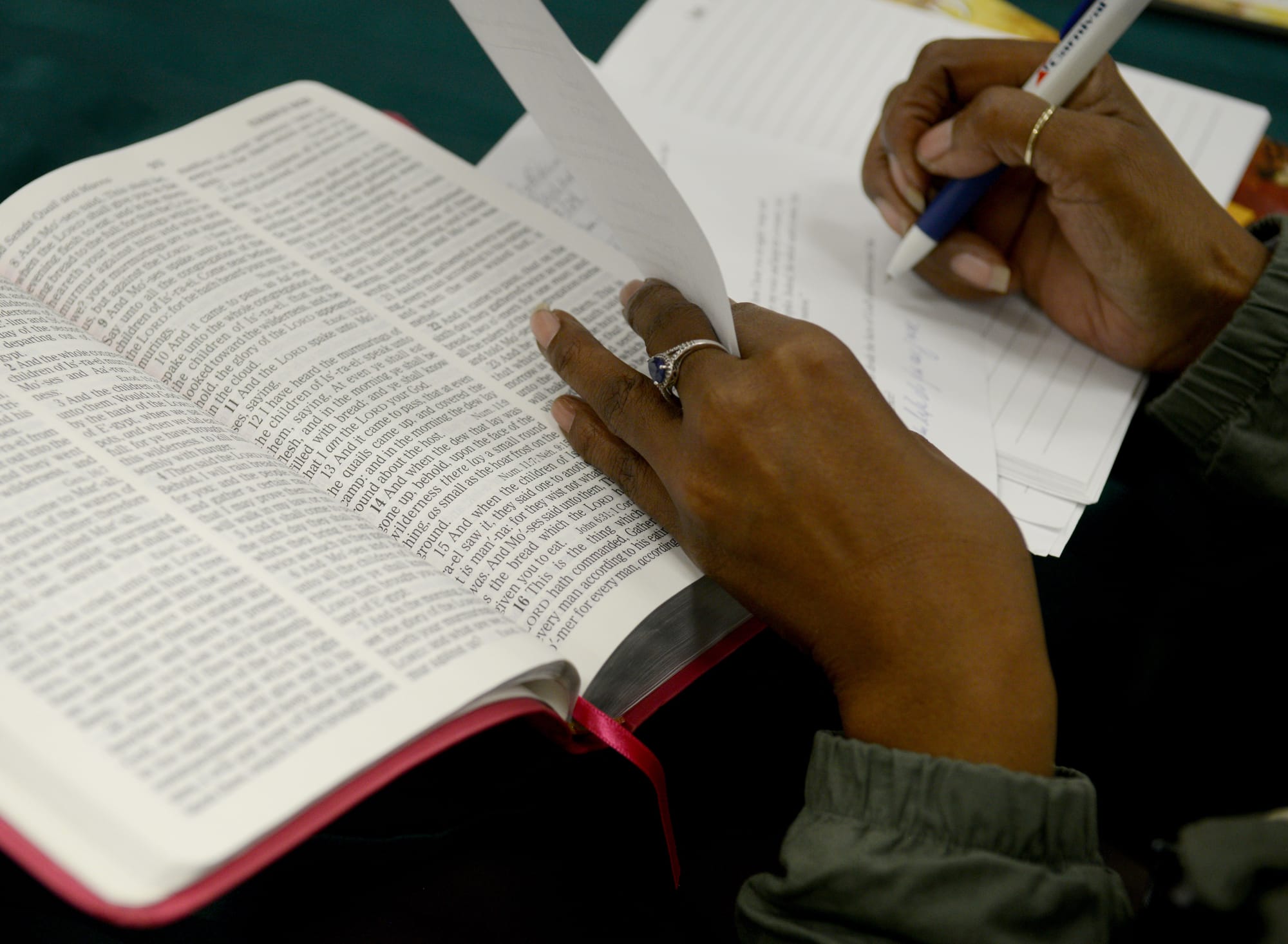
Joy Sylvester-Johnson, the former longtime CEO of the Roanoke Rescue Mission who attends a Quaker meeting, considered children she had once met in Nairobi, little ones born into miserable poverty, but who would share what little they had with family or neighbors.
“In Roanoke, too, sometimes those that have the least are the most generous,” she said.
Pat Barber, who goes to Sweet Union Baptist Church, found God’s unexpected glory during a trip to Bermuda. Stephanie Goodman from Hill Street Baptist found it in the calm waters during an Alaskan cruise. Faye Wood said that a friend’s wilderness was one of disease, where she, too found grace and peace.
Everybody’s got something going on that they’re dealing with — that seemed to be the running theme at many tables. A little empathy and kindness go a long way.
Ryan Bell, an educator who works at Dorcus Home, a transitional housing facility for ex-offenders, and who operates a nonprofit initiative for Black fathers, said that the free-wheeling conversations are his favorite parts of the bible studies.
“I enjoy the generational lines,” said Bell, who, at age 35, is one of the youngest participants. “You might be sitting at a table with somebody who is Black or white, someone in their 80s. You get life lessons. Yes, we’re talking about the questions, but sometimes there will be this little gem, a perspective-changing moment.”
When an older white woman at his table said that there must be grace to go along with enforcing rigid laws, whether in a church, a household or a society, Bell realized that maybe he did not always allow his own children enough leeway to make their own mistakes and learn from them.
“That was the ‘aha moment’ for me,” he said.
Bell said that he would like to see younger people come to the studies, but acknowledged that meeting at noon on a Wednesday is hard for folks with day jobs.
“More conversations will bring about more success,” he said. “More diversity from people in their 20s and 30s would be considered a success. Maybe this can be just the beginning.”
The weekly conversations do have more real-world objectives than simply bringing folks together to talk about Exodus over coffee, Anderson said. His own church has increased its financial support of missions and agencies that work to address housing, poverty, crime and other Roanoke problems.
Second Presbyterian supports healthcare ministries and clinics that include New Horizons (which Lee helped establish), the Bradley Free Clinic and the Roanoke Rescue Mission’s psychiatric care programs. The congregation increased support for Restoration Housing, which provides affordable residences for lower-income and older people.
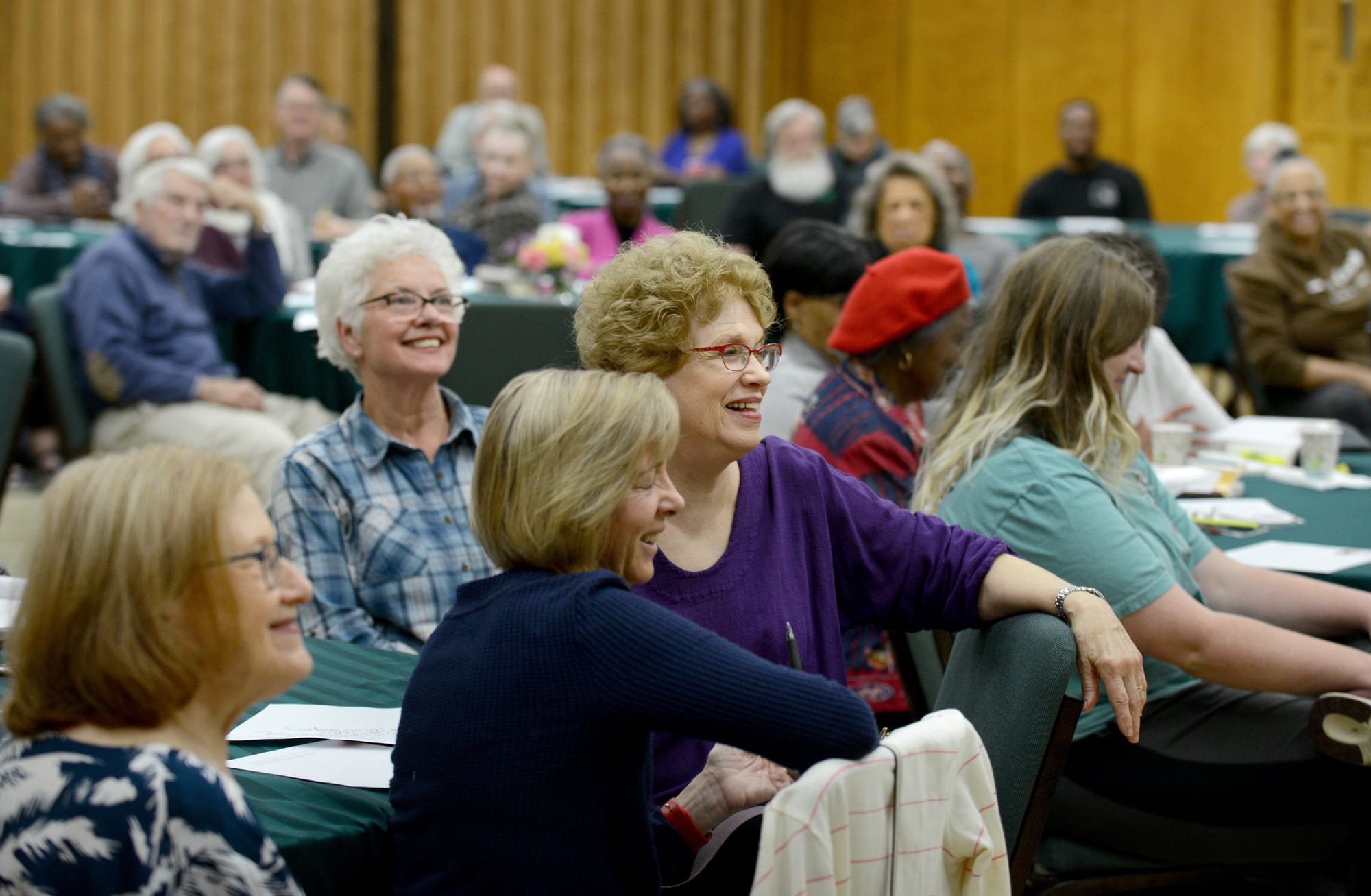
Anderson and Lee are members of the Roanoke Collaboration Project, a fairly new initiative that brings together business, religious and other civic leaders “who believe that collaboration across diverse stakeholders is key to making communities more resilient in the years ahead,” according to the group’s website. The group held a community forum on gun violence, race relations, affordable housing and other topics last fall at Virginia Tech Carilion Riverside School of Medicine.
Anderson said that his congregation is tackling topics long ignored within the city.
“We’re addressing areas that have been impacted by poverty and Roanoke’s long history of racial inequity,” Anderson said.
The Rev. Martin Luther King Jr. was quoted as saying in 1964 that “11 a.m. Sunday is our most segregated hour,” which put the spotlight on the fact that Black and white people rarely shared pews in the same congregations. Sixty years later, that is still generally the case.
Even during the weekly bible studies, each minister notes the diversity of preaching and worship styles. Lee, accustomed to choruses of “amens” and more active participation from Black congregations, often exhorts the attendees to respond to his words. “Y’all still with me?” he’ll ask. After one of Lee’s talks, Anderson said he felt like a guy following a Mozart aria by whistling the tune to “The Andy Griffith Show.”
Lee, though, doesn’t care where people decide to attend church. He and Anderson both said that people will go to churches where they feel comfortable and where they feel a shared culture being celebrated. Lee said what happens after the benediction is prayed is more important.
“I don’t get caught up in where people go to church,” he said. “What’s important to me is what happens when we leave church. Are we doing what is right, and are we committed to lifting people up? Do we teach, preach and adhere to the ethic that we are all God’s children? There is a lot of segregated stuff in this country that is not going to change. Treating people better, that is the thing.”
As Lee wound up a recent bible study, he urged that participants not let the fellowship end at the close of the session.
“We don’t have to wait until the next class to be with each other,” Lee told the gathering. “Invite each other to lunch. Invite someone to your house, to sit on your front porch. Shock your neighbors.”

